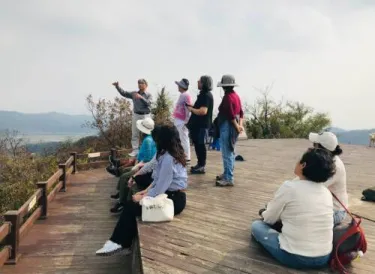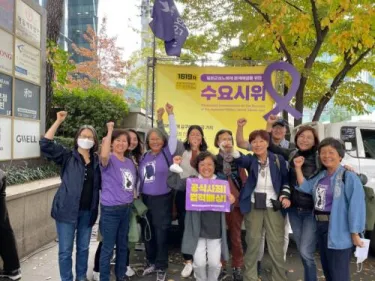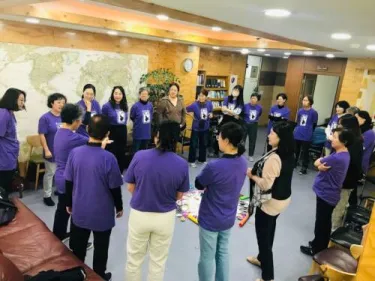2023 Korea Travel Seminar with Korean American Presbyterian Clergywomen
A Letter from Kurt Esslinger and Hyeyoung Lee, serving in Korea
Subscribe to our co-worker letters
Blessed are the peacemakers, for they will be called children of God. –Matthew 5:9
Dear friends,
“The songs of peace we sing are more powerful than the nuclear weapons we fear.” This is part of the lyrics from a peace campaign song written by Rev. Choong-Jae Lee, a director of Border Peace School (BPS). BPS is an independent school that started in 2013 in Cheorwon, a border town, to educate and equip those who want to build peace between the two Koreas.

A group of Korean American Presbyterian Clergywomen (KAPCW) visited this school and learned about the chaos the town experienced during the Korean War. Rev. Lee explained to us that Cheorwon was bombed over 300,000 times and that it changed between the jurisdiction of North and South 24 times during the Korean War. On our visit, we went up to Soi Mountain where we prayed for peace and the reconciliation of the Korean Peninsula and sang songs of peace at the summit as we looked across the Demilitarized Zone (DMZ) into North Korea.
Ten members of KAPCW, a network within the PC(USA), came to Korea in October to participate in an 11-day travel seminar to learn about the history of Korea, especially the hidden history before and after the Korean War, and to recommit themselves to the work of peace and justice in Korea as well as in other parts of the world. Before the trip, the participants prepared by reading study materials and participating in educational workshops over Zoom. However, visiting historical sites on Jeju Island, military bases, and the DMZ to learn about the complex background of the Korean War and the continuing effect of militarism on the Korean Peninsula in person, was much more impactful than learning through texts or online. Since most of the participants had left Korea in the 1960s, 70s and 80s, each one of them has family stories that are related to the Korean War. This travel seminar was organized to reflect on who they are as persons with ties to Korea including their complex identities as Koreans and Korean Americans. One of the participants mentioned, “Learning about the complex and painful stories of my motherland and being able to go see the sites and hear the stories of people was very eye-opening for me. I was able to connect the dots that I missed growing up.”

This trip included learning about how war affects women’s lives by visiting the War and Women’s Human Rights Museum and Durebang (My Sister’s Place). The War and Women’s Human Rights Museum documents and teaches visitors about the history of the Japanese military’s “comfort women” and works towards a just resolution of the Japanese military sexual slavery issue. After visiting the museum, participants attended the “Wednesday Demonstration.” This demonstration has been taking place every week for more than 30 years in front of the Japanese embassy and aims to obtain justice from the Japanese government regarding the large-scale sexual slavery system established under Imperial Japan rule during World War II. Durebang is an organization and counseling center that works to eliminate prostitution, and human trafficking for sexual exploitation within camp-towns outside U.S. military bases in Korea as well as to challenge militarism. Both issues are closely related to the lives of vulnerable women in the midst of war and militarization. One participant said, “My heart feels heavy with grief thinking about the horrific, systematic gendered and militarized violence these women endured, and the narratives constructed to justify their abuse. Wherever there is war and militarization, there is violence against women. Even still, learning about this reminded me that wherever oppression exists, courageous acts of testimony also exist. The power, dignity and agency of survivors persist, in fierce opposition to those who try to erase and silence their pain.”

Participants also met with Korean clergywomen serving in Korea in various capacities and shared each other’s stories. During the meeting, we had the opportunity to reflect on how we experience our identity as clergywomen in different contexts and how this intersects with our ministry in ways that are both affirming and challenging. Although these groups never met before, there was an immediate sisterhood confirmed as we exchanged stories, shared tears, sang, danced and ate together.
The 11 days of the travel seminar with our Korean American clergy sisters provided a meaningful time for all of us. This visit, where women wishing for peace gathered to visit various parts of Korea, pray, sing, dance and share stories, was an opportunity to ignite the embers of peace in our hearts. We hope this journey will not end here, but this was an opportunity to start a new beginning of our peacemaking journey.
As we come nearer to the time of Advent when we prepare our hearts for the coming of the Christ child, I hope for the coming of Christ’s peace to Korea. For all those around the world living through war and conflict, I pray that God’s incarnated presence will lead everyone to peace and understanding. As Jesus is our peace, I hope that we can learn to work to heal and not to kill. Finally, I pray that we will join together to build peace on this earth and become peacemakers in our own lives. Amen.
Hyeyoung and Kurt
